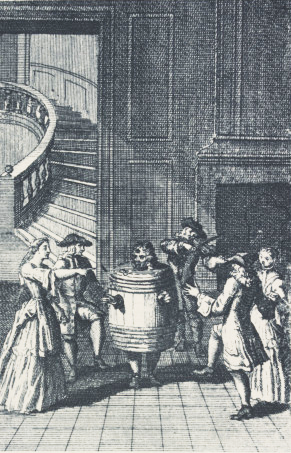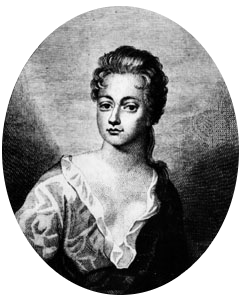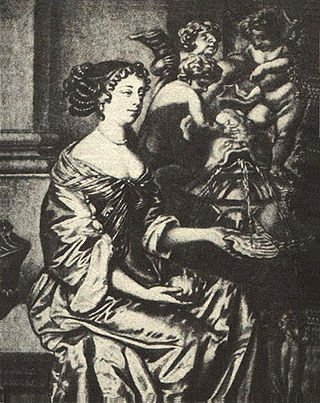
Aphra Behn was an English playwright, poet, prose writer and translator from the Restoration era. As one of the first English women to earn her living by her writing, she broke cultural barriers and served as a literary role model for later generations of women authors. Rising from obscurity, she came to the notice of Charles II, who employed her as a spy in Antwerp. Upon her return to London and a probable brief stay in debtors' prison, she began writing for the stage. She belonged to a coterie of poets and famous libertines such as John Wilmot, Lord Rochester. Behn wrote under the pastoral pseudonym Astrea. During the turbulent political times of the Exclusion Crisis, she wrote an epilogue and prologue that brought her into legal trouble; she thereafter devoted most of her writing to prose genres and translations. A staunch supporter of the Stuart line, she declined an invitation from Bishop Burnet to write a welcoming poem to the new king William III. She died shortly after.

"Restoration comedy" is English comedy written and performed in the Restoration period of 1660–1710. Comedy of manners is used as a synonym for this. After public stage performances were banned for 18 years by the Puritan regime, reopening of the theatres in 1660 marked a renaissance of English drama. Sexually explicit language was encouraged by King Charles II (1660–1685) personally and by the rakish style of his court. Historian George Norman Clark argues:
The best-known fact about the Restoration drama is that it is immoral. The dramatists did not criticize the accepted morality about gambling, drink, love, and pleasure generally, or try, like the dramatists of our own time, to work out their own view of character and conduct. What they did was, according to their respective inclinations, to mock at all restraints. Some were gross, others delicately improper.... The dramatists did not merely say anything they liked: they also intended to glory in it and to shock those who did not like it.
This article contains information about the literary events and publications of 1677.
This article contains information about the literary events and publications of 1666.

The City-Heiress, or, Sir Timothy Treat-all is a play by Aphra Behn first performed in 1682. The play, a Restoration comedy, reflects Behn's own highly Royalist political point of view.

Anne Bracegirdle was an English actress.

Mary Saunderson (1637–1712), later known as Mary Saunderson Betterton after her marriage to Thomas Betterton, was an actress and singer in England during the 1660s and 1690s. She is considered one of the first English actresses.

The Duke's Company was a theatre company chartered by King Charles II at the start of the Restoration era, 1660. Sir William Davenant was manager of the company under the patronage of Prince James, Duke of York. During hats period, theatres began to flourish again after they had been closed from the restrictions throughout the English Civil War and the Interregnum. The Duke's Company existed from 1660 to 1682, when it merged with the King's Company to form the United Company.
Abdelazer; or, The Moor's Revenge is a 1676 play by Aphra Behn, an adaptation of the c. 1600 tragedy Lust's Dominion. It is Behn's only tragic play.
Thomaso, or the Wanderer is mid-seventeenth-century stage play, a two-part comedy written by Thomas Killigrew, The work was composed in Madrid, c. 1654. Thomaso is based on Killigrew's personal experiences as a Royalist exile during the era of the Commonwealth, when he was abroad continuously from 1647 to 1660.
Anne Marshall, also Mrs. Anne Quin, was a leading English actress of the Restoration era, one of the first generation of women performers to appear on the public stage in England.

The Feign'd Curtizans, or, A Nights Intrigue is a 1679 comedic stage play by the English author Aphra Behn. Behn dedicated the play, originally performed at the Duke's Company in London, to the well-known actress and mistress of King Charles II, Nell Gwyn.
Anne Shadwell was an English stage actor of the seventeenth century. She was one of the first English actresses to appear on stage following the Restoration She was one of six actors recruited in 1660 by William Davenant for the new Duke's Company, acting under her maiden name Anne Gibbs. Sometime between 1663 and 1667 she married the playwright Thomas Shadwell with whom she had four children. While some sources have her acting late into the century, it may be she effectively retired with the formation of the United Company in 1682. Her appearances had decreased since 1672. Following her husband's death in 1692 she was left the bulk of his estate. She had an investment in the Drury Lane Theatre in 1709, when she joined a petition to Queen Anne by the manager Christopher Rich, but nothing is known about her after this point.
The Forc'd Marriage; or, The Jealous Bridegroom is a play by Aphra Behn, staged by the Duke's Company on 20 September 1670 in Lincoln's Inn Fields, London, England. This sex tragicomedy ran for six nights, which granted Behn the house profits for both the third and six nights. It is considered her first staged play. Thomas Otway played a "probation part."
The Widdow Ranter, or, the History of Bacon in Virginia is a tragicomic play written by Aphra Behn and first performed posthumously in 1689. It is a highly fictionalized version of Bacon's Rebellion of 1676, and is one of the first plays to be set in British colonial America. It is also the first travel play known to have been written not only by a woman, but by a playwright who had actually traveled to the Americas.
The Younger Brother, or, The Amorous Jilt is a comedy written by Aphra Behn. The play was first performed and published posthumously in 1696, but was probably written in the late 1680s.
Elizabeth Currer was an Irish stage actress of the Restoration Era. She was a member of the Duke's Company during the 1670s and subsequently part of the merged United Company from 1682. Although she was likely acting in London several years earlier than this, her first known role was in The Conquest of China in 1675. Due to the irregular spelling of the time her surname is sometimes written as Carrier, Corer and Currier amongst other variants.

The Counterfeit Bridegroom; Or, The Defeated Widow is a 1677 comedy play. The work's authorship is usually credited to Aphra Behn has been alternatively been attributed to Thomas Betterton. It was inspired by Thomas Middleton's Jacobean play No Wit, No Help Like a Woman's.
John Crosby was an English stage actor of the Restoration Period. He first recorded performance is in 1662 when he appeared in Ignoramus at Whitehall Palace, likely as a child actor. It was further eight years before he was solidly established in the Duke's Company in 1670 beginning with The Forc'd Marriage by Aphra Behn. He became a regular with the company over the following decade, often playing young lover roles. He retired from the stage in 1679 and later became a justice of the peace for Middlesex. He died on 8 April 1724 and was buried in St Sepulchre.
Emily Price was an English stage actress of the seventeenth century. She was a member of the Duke's Company between 1676 and 1682, acting at the Dorset Garden Theatre in London and then joined the merged United Company. She was a friend of the playwright Aphra Behn and appeared in several of her plays. She was billed as Mrs Price.









